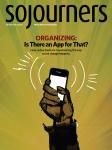Writing a succinct but comprehensive ethnographic account of early online Christian communities is a daunting task, but Robert Glenn Howard manages to pull it off with his hefty overview. He focuses on Internet evangelism and how some traditionalists have found it an unsatisfying substitute for brick-and-mortar churches, even as it has inspired multitudes of other individual believers and sparked communities that are like-minded but geographically disconnected.
In Digital Jesus, Howard introduces readers to a lively cast of characters, including retired physicist Lambert Dolphin and online evangelist and writer Marilyn Agee. Though both lived in California and built two of the first Christian web communities, they were unaffiliated, yet connected as early as 1999 by thousands of believers who treated them as part of the same spiritual web. To explain their notability, Howard compares these virtual crusaders to early Christian evangelists such as D.L. Moody, nonordained leaders who feel called to minister. He explores how Agee, who believed God had given her access to divine knowledge, interpreted the events of Sept. 11, 2001, for her community, which at that time numbered in the thousands.
Generally speaking, much of Howard's analysis focuses on how the Internet has enabled groups of disparate believers to prosper. He traces the rise of specific online Christian resources with an emphasis on the tools used by individual groups. For example, early Usenet newsgroups, virtual forums that act as public bulletin boards, were diverse spaces in which fundamentalist language was not welcomed. Instead, he found that only as the Internet became an increasingly common way to find like-minded believers was there enough interest to make viable forum-based communities on sites such as BibleForums.org, MyChurch.org, and even RaptureForums.com. Though some web-based communities have since abandoned forums and migrated to networked blogs, some of the most robust faith-based virtual communities have held tight to technologies that offer discursive deliberation space. Anyone who has spent more than 10 minutes reading a thread on Facebook or trying to follow replies on Twitter knows that sometimes only an online salon will do.
According to Howard, it's worth noting that homogeneous online spaces are not always a good thing. Christian communication enclaves can protect members from offensive comments by banning outsiders, but avoiding other worldviews altogether can lead to insular spaces rife with prejudice against other faiths, difficult viewpoints, and healthy debate. Similarly, he traces the growing rift between the need to express individual authority and engage others in debate and the proliferation of the participatory web.
Most poignant, Howard points to the Internet’s power to disseminate and keep alive predictions about the Rapture. He doesn't pass judgment on the trend, but he does spend considerable time poring over virtual Christian apocalypticism, detailing how it has influenced a modern revival of end-times prophecies and storytelling. Even beyond Howard's scope, this ideological renaissance is apparent in the popularity of Tim LaHaye's Left Behind series, films like The Road and The Book of Eli, and even in more marginal popular culture and academic studies, such as Slovenian philosopher Slavoj ?i?ek's most recent tome, Living in the End Times.
Howard concludes that believers have an increased responsibility for the nature of their religiosity when they're able to construct their spiritual worldview from the multitude of perspectives online. In a time when faith can be and is so easily customized, personal ideology is increasingly constructed beyond the confines of traditional religious institutions and with a more voluntary, independent approach to spiritual seeking.
Ethnography can be a cumbersome genre, and though at times Digital Jesus is a dense, academic read, it offers insight into the ways some Christians have moved away from formal institutionalized religion toward a virtual ekklesia, or online worship and fellowship space. Some have found space to prepare for the Rapture, and others have simply found community beyond the four walls of their local church.
Brittany Shoot is a writer based in Boston and Copenhagen.

Got something to say about what you're reading? We value your feedback!